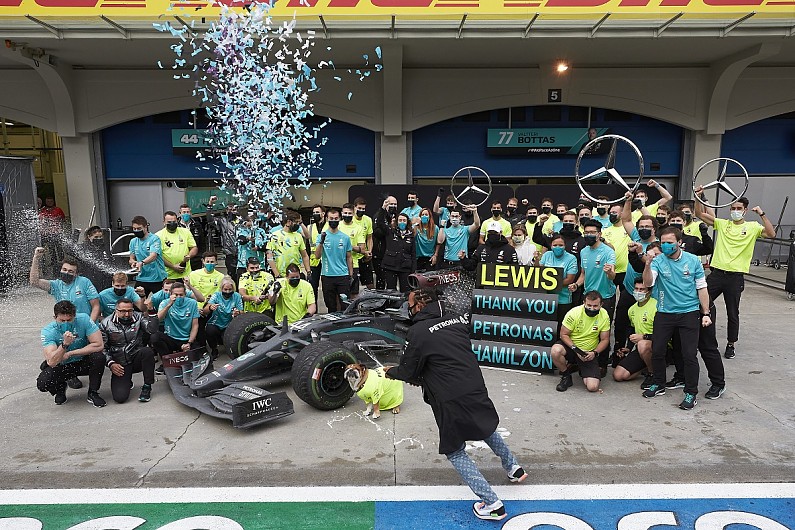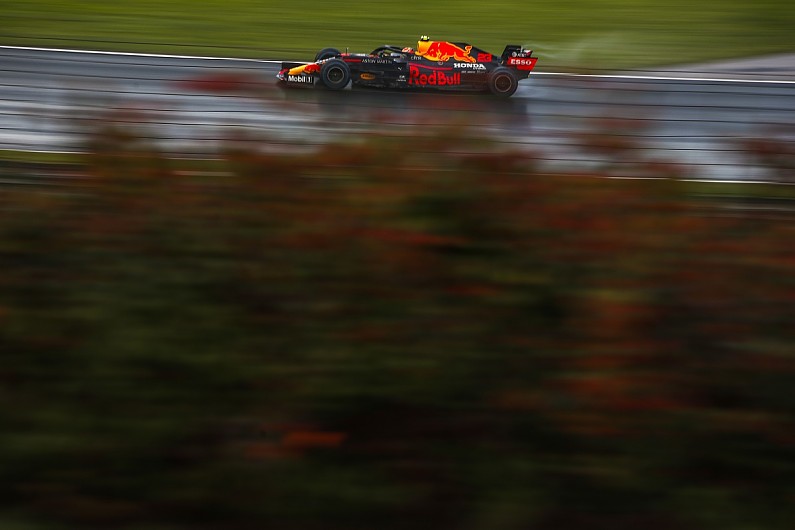Formula 1’s return to Turkey after nine years away produced a topsy-turvy race on a perilously slick surface, and provided the platform for another piece of history to be made. LUKE SMITH outlines the major talking points
Lewis Hamilton clinched his seventh Formula 1 world champion in style with a dominant victory in Sunday’s Turkish Grand Prix, taming tricky conditions that caught most of his rivals out.
A topsy-turvy Turkey weekend ended with a familiar face at the top of the podium, but the rest of the race was far from straightforward.
The race produced a number of big storylines that will make F1’s return to Istanbul one that lives long in the memory, beyond Hamilton equalling the record for the most world championships held by Michael Schumacher.
Here are 10 things we learned from the Turkish Grand Prix.

1. Turkey was Hamilton’s most stylish title clincher yet
Hamilton has rarely secured the Formula 1 drivers’ title in dominant fashion. In fact, only twice has he won the title-clinching race (in 2014 and 2015), and has been on the podium just once since then to mark his championship victory.
It looked as though the seventh title would be won in underwhelming fashion after Valtteri Bottas spun twice on the first lap and dropped to last, while Hamilton was more than a pitstop off the lead in just a few laps as he ran sixth.
PLUS: How Hamilton’s critical changes decided a race “that wasn’t his to win”
But superb tyre management allowed Hamilton to gain on the lead runners and make his intermediates last 48 laps, turning in personal bests right the way to the end.
Fears of new intermediates graining meant Mercedes kept Hamilton out despite having enough of a window to take a free stop, with his eventual margin of victory standing at 31 seconds over Sergio Perez.
Given Hamilton sat 20 seconds back from race leader Lance Stroll before he pitted on lap eight, it was a remarkable turnaround – but one Hamilton entirely earned and fought for, again proving why he is the defining driver of his era.
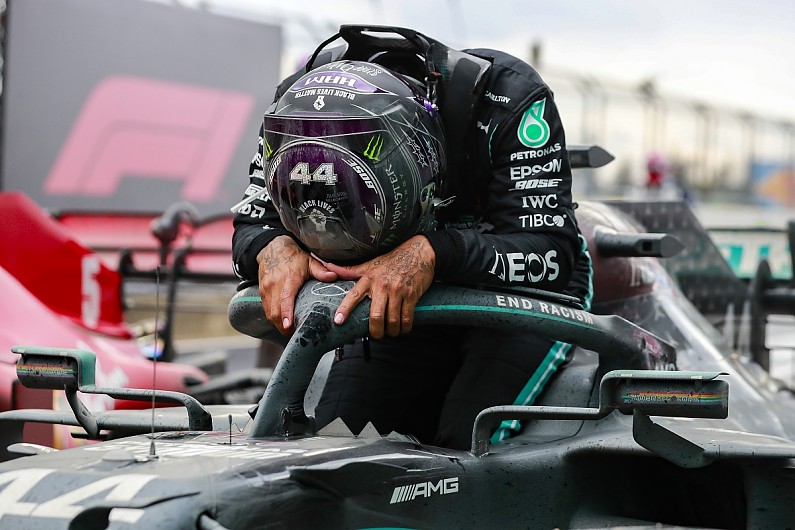
2. This seventh title means the most to Hamilton
Comparing the sporting achievement of world championships is always difficult, but Hamilton’s seventh title is by far the most significant and important to him.
Hamilton said at the start of the year that a potential title win would mean a lot in the context of the ongoing challenges around the world right now: the COVID-19 pandemic; and activism against racism and to improve racial equality, something Hamilton has been at the forefront of.
Similar to the lead-up to Hamilton matching Schumacher’s win tally at the Eifel GP, the prospect of a seventh title was something the Briton made clear he was not dwelling on in the build-up to the race.
But as he came into parc ferme and the magnitude of the achievement hit him, Hamilton struggled to keep his emotions in check – something of a rarity. He visibly fought back tears through his interview, and later revealed he failed to on the in-lap.
“When I came across the line, it really hit me and I just burst into tears, that whole in-lap,” Hamilton said. “I really just couldn’t get out of the car because I just couldn’t believe it.”
As sweet as the other six titles may have been, this one stands out above the rest for Hamilton.
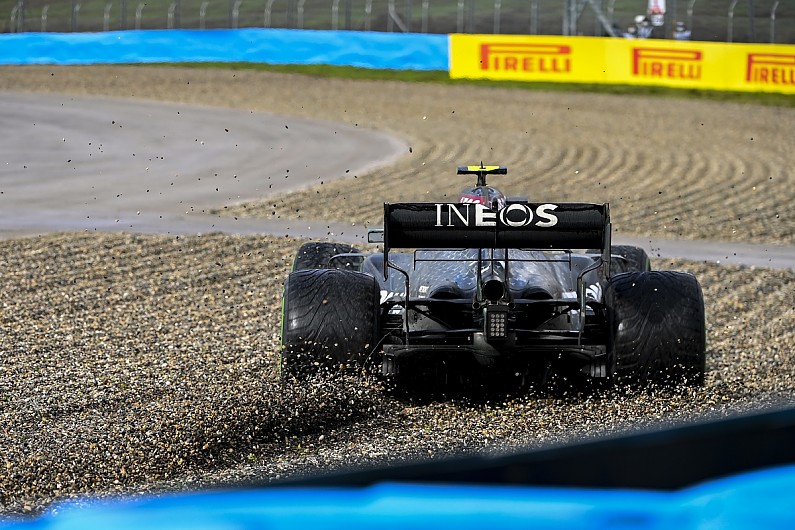
3. Bottas needs momentum as he heads back to the drawing board
Valtteri Bottas’s final stand in the 2020 title race turned into something of a whimper as he endured a “disaster” race that he thought was the most difficult of his F1 career.
A spin at Turn 1 avoiding Esteban Ocon followed by contact in a clash with the Renault driver on the opening lap left Bottas last, and with damage to his car, resulting in another four spins through the race as he limped home in 14th.
Bottas has won just once since the coming of ‘Bottas 3.0’ was hailed with his season-opener win in Australia, and struggled to capitalise on the few opportunities Hamilton has afforded him.
PLUS: 10 moments that decided the 2020 F1 title
But after so much buzz around new tactics and approaches to finally defeat Hamilton in the title race, Bottas is again going back to the drawing board.
The final three races of the year offer him a pressure-free chance to try and build some momentum, as Nico Rosberg did at the end of 2015 – although it’s doubtful Hamilton will let his guard down and give him any opportunity to do so.
“For sure there is no pressure,” Bottas said. “I’ll see if that makes any difference. I look forward to those races in terms of trying to get good results and learn more, but mostly I look forward to next year.”
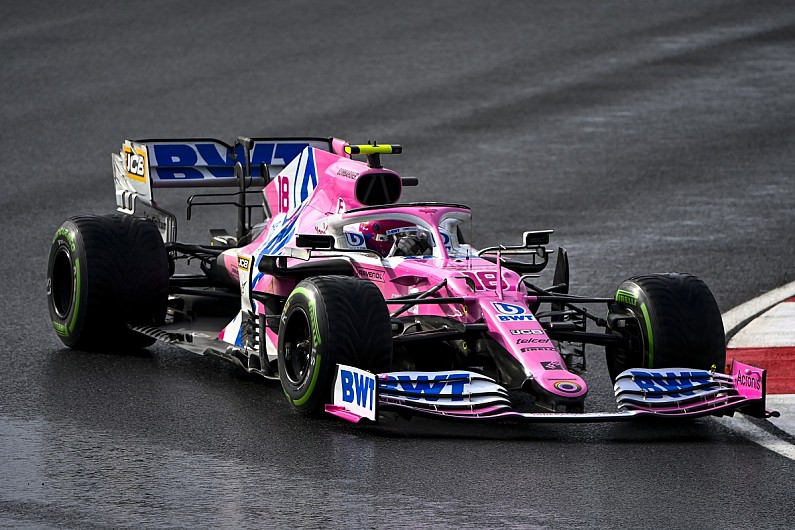
4. Stroll deserves huge credit for his performance
On a not-too-different timeline of the Turkish Grand Prix, the pages of Autosport may have been filled hailing a new grand prix winner in Stroll.
Early in the second stint of the race, the Canadian sat more than 10 seconds clear of team-mate Perez and had been composed at the head of the field. Only when his tyres started to grain did his pace drop off, but he was mistake-free.
The decision to pit just as Perez closed up ultimately backfired for Stroll as the graining started almost immediately, causing him to fall down to ninth place at the chequered flag. Racing Point has since claimed Stroll had front wing damage that was not visible, explaining his drop in pace.
PLUS: How tyre strategy limbo dashed Stroll’s victory hopes in Turkey
Regardless of the end result, Stroll deserves a ton of credit for his display. No-one could have said he did not deserve to win the race had he held on, nor can his shock charge to pole position ever be taken away or watered down. It was a big statement to make, particularly after his recent “rough patch” and struggles since returning from illness.
Hamilton’s seventh title may have all the headlines, but Turkey 2020 is likely to be remembered as the race where Stroll had a real chance of victory.

5. There’s life yet in Vettel, contrary to popular opinion
Sebastian Vettel’s first podium appearance in more than a year may have been a long time in the making, but he was one of the star performers in Turkey as he put in an error-free display.
Vettel was brilliant in defending against Hamilton through the first stint on wets – bad news for Mercedes’ Twitter admin, who joked earlier in the week that Ferrari was always behind Hamilton – and did well to keep up the pressure on Perez and Charles Leclerc in the closing stages.
PLUS: Why Vettel’s next move can define his F1 legacy
When Leclerc ran wide with two corners to go, Vettel was able to nab a richly-deserved podium, almost doubling his points tally for the year and hitting back at the mounting criticism after a difficult season.
Vettel himself after the race said he was “shocked” by a journalist’s question that asked if the podium proved he was still capable of being the driver that had won four world titles, saying he’s never doubted his own ability. But this was nevertheless an important reminder of the class he possesses and the kind of performances he can still deliver, even in difficult conditions and with a troublesome car.
6. Albon might not get a better chance to make the Red Bull seat his
There was a time during Sunday’s race where Alexander Albon appeared to be on course to claim a shock victory in Turkey. After seeing team-mate Max Verstappen fritter away his chances with a spin in pursuit of Perez, Albon had cruised up to the rear of the Racing Point, and was just three seconds behind race leader Stroll.
But Albon couldn’t finish the job. A spin exiting Turn 4 dropped him behind eventual winner Hamilton and forced him into an early second stop, ending his chances of victory. Albon finished seventh in the end, behind Verstappen.
Red Bull has said repeatedly that it wants Albon to deliver the kind of result that proves he should remain with the team for 2021, and that it will give him the time to do so. But there are only so many chances he is going to get. A victory – or perhaps even a podium – in the tricky conditions would have given Red Bull justification to keep him for next year. Instead, the man who could replace him – Perez – was the man finishing second.
One crumb of comfort for Albon is that he was not blown away by Verstappen this weekend. Verstappen also made a number of errors in the race, so if he is the yardstick for comparisons, Albon was hardly a million miles off. Nevertheless, an opportunity was missed.

7. Perez not being on the grid next year is ridiculous
There are drivers who slip through the cracks in the driver market each year. For 2019, it was Ocon. For 2020, it was Nico Hulkenberg. And the man most likely to take that role in 2021 is Perez.
But rarely has there been such a compelling case for that driver to be on the grid than it is right now with Perez. F1’s resident tyre whisperer proved his class yet again in Turkey, scoring his best result since Monza 2012 with a brilliant run to second place for Racing Point.
Perez soaked up pressure from the likes of Verstappen, Albon, Leclerc and Vettel through the race, and bested all of them – only Hamilton was able to put a pass on him. He made a couple of small errors, but never replicated the spin he endured on his final Q3 lap.
The result lifted Perez to fourth in the drivers’ championship, which is remarkable considering he missed both Silverstone races due to COVID-19. He has scored points in every race he has appeared in this season, single-handedly carrying Racing Point’s push for third in the constructors’ championship of late.
The likes of Haas and Alfa Romeo may have other reasons for passing over Perez, but it is still unthinkable and frankly ridiculous he won’t be on the grid next year, so good has he been through 2020.
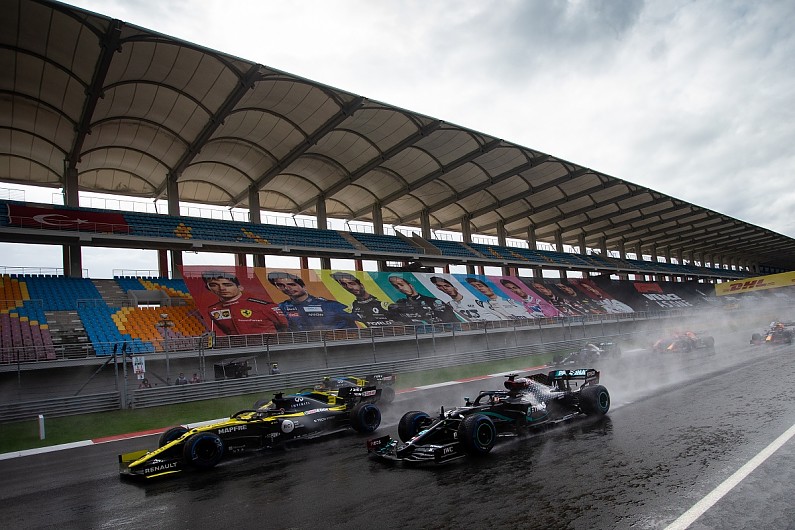
8. Renault may be out of the fight for third in the constructors’ championship
The first 200 metres of the Turkish Grand Prix were a dream for Renault. Ocon and Daniel Ricciardo both made great starts, and looked set to come out of Turn 1 third and fourth respectively.
But that was as good as it got. Ricciardo was forced to give Hamilton some space up the inside, inadvertently causing contact with Ocon, who was sent into a spin. Ocon was then hit by Bottas at Turn 9, resulting in a second spin on the opening lap.
In the end, Renault came home with just a single point to its name as Ricciardo finished 10th ahead of Ocon in 11th, losing significant ground in the fight for third in the constructors’ standings. Racing Point now sits 18 points clear, while McLaren rallied to grab a double-score with Carlos Sainz Jr and Lando Norris, meaning it is only five points back.
Both Ricciardo and Ocon are relaxed about their chances, feeling a lot can swing their way in the final three races, but the reality is that a big opportunity went begging for Renault in Turkey.
Still, credit must go to McLaren for its under-the-radar race, with a late highlight coming from Norris as he deliberately wore down his intermediates so they were like slicks to allow for a fastest lap charge on his final tour of the circuit.

9. Turkey proved grip isn’t everything, but it matters
The delayed resurfacing of Istanbul Park meant the track had just two weeks to prepare for F1’s arrival, resulting in an incredibly low grip surface that left drivers struggling in all conditions.
Rain only worsened the situation for Saturday and Sunday, contributing to the numerous spins seen throughout the race. Williams driver George Russell said the concrete areas off-track had more grip than the track itself, and said the struggles drivers faced were “not what F1 is about”.
There are two sides to the debate. While it was a great shame we did not get to see the fastest cars in F1 history blasting around Turn 8 and really maximising such a mega circuit, we did get to see drivers showing off a very different set of skills.
Vettel said the conditions gave drivers “more ability to make a difference”, adding: “You’re still depending on if you get the tyres in the window, and how the car works, but there’s more room to express yourself.”
Nevertheless, this is a lesson F1 must learn from. Race director Michael Masi did not answer a question about the approach to track resurfacing after the race, only praising the organisers in Turkey, but it must be addressed. It was the only topic in Friday’s drivers’ briefing, so clearly it is something the grid cares about.
Entertaining? Yes. But to make all tracks low grip would be a needless and damaging gimmick for F1 that it will hopefully not consider for the future.
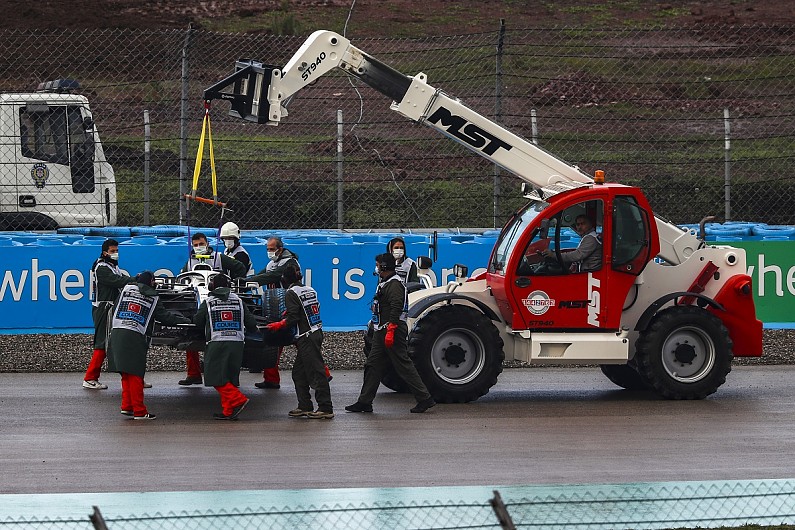
10. The Q2 crane incident should not be brushed aside
Perhaps the most shocking incident of the weekend came in qualifying when, after an hour-long Q1 due to heavy rain and a red flag, Q2 began under yellow flags.
The session went green and cars joined the track while a crane was still clearing Nicholas Latifi’s stricken Williams at Turn 8, causing anger and confusion among the drivers – many of whom raced in 2014 when Jules Bianchi sustained ultimately-fatal head injuries.
Masi explained after the race that the session had gone live because the local clerk of the course said the crane would be out of the way by the time the cars got to Turn 8, but this turned out not to be the case.
It still wasn’t an excuse that washed. “I think we are all humans, and mistakes happen,” said Vettel. “But this mistake has a zero tolerance. I think we’re all well aware and I’m very confident that it will not happen in the future again. But we will for sure talk about this and disclose the reasons why.”
Not for the first time this season, big questions need to be answered by the FIA over the decisions taken in race control.
Autosport has produced a standalone special magazine to celebrate our 70th birthday. All current print subscribers will receive a copy for free. To pre-order your copy of the 196-page Autosport 70th Anniversary issue, please go to: autosport.com/autosport70th
